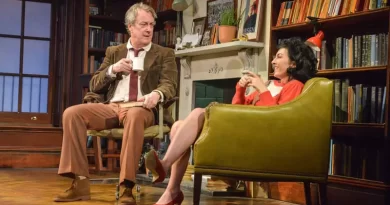“Backstroke” at Donmar Warehouse
Jane Edwardes in the West End
22nd February 2025
Anna Mackmin was brought up on a hippyish commune in Norfolk by a wayward mother who left her daughters to fend for themselves. It’s a subject that Mackmin explored in her debut novel Devoured, and there are surely echoes of her mother, ageing and suffering from dementia, in her first play, which, despite painful and funny moments, is always struggling to keep its head above water.

Georgina Rich and Tamsin Greig.
Photo credit: Johan Persson.
Mackmin, who also directs, is lucky to have a terrific cast with Celia Imrie as Beth, the mother, and Tamsin Greig as the daughter, Bo. In some ways, the play is a familiar tale of a middle-aged woman, who is pulled between an ageing parent at one end and a demanding child at the other.
For the first few scenes, we see Imrie’s Beth lying comatose in a hospital bed following a stroke in her 70s. Her harassed daughter is a frequent visitor. Bo hovers anxiously over her mother, strangely reluctant to touch her, but still determined to make sure that her mother’s wishes are fulfilled – no yoghurt! – fending off hospital staff who are keen to extend Beth’s life at any cost. At the same time, Bo is fielding phone calls from teachers at her adopted daughter’s school complaining about her behaviour. On film, we see flashbacks to Bo’s childhood, as well as scenes of the nightly demands as she struggles to cope with her disturbed daughter.
But you don’t cast Imrie to have her unable to speak for the entire play, and, inevitably, she is soon hopping in and out of bed and into her kitchen, complete with an Aga, downstage (design Lez Brotherston) in order to look back – though not in a linear fashion – on the complicated relationship between Beth and Bo.
Beth is the kind of woman who might be entertaining to meet, but who you would dread to have as a mother. Her long, unwashed hair is tinged with red at the tips. She dresses in exotic garments that are full of holes and wraps herself in shawls. She is needy and narcissistic. Instead of being supportive, she is competitive with her daughter; over their looks, their creativity, and, above all, their sexuality. She lives in a world where men fall at her feet. She is part of the me-generation, who consider themselves free spirits, luxuriating in an adventurous sex life. In fact, her happiness hinges on her appeal to men. “Men don’t like clever women,” she advises her daughter, while also criticizing her for wearing “a lesbian woolly”.
Once a practical woman, as time goes on and Beth becomes even more needy and dementia sets in, Imrie revels in her confusion: “Do not, whatever you do, allow the Bad Fairy Blame down the chimney.”
It is hardly surprising that Bo rebels, and over the years we see how she struggles to carve out a life of her own. As a young child, her mother’s free spirit excites her, but gradually she becomes prudish and cautious, embarrassed by Beth’s impulsiveness. Neither holds back as Bo learns to hold her own against a mother who is happy to point out that she is no beauty and that she should stay off the cream to keep her figure.
Her mother’s chaotic lifestyle increasingly appals her. While Beth sits at the table smoking, Greig is constantly on the move as Bo attempts to clear up the mess. Who’s the parent here? She is often drenched in menopausal sweat (which, of course, Beth suffered from so much more badly), and endless phone calls remind her of her child’s needs back home.
Despite all the differences, the bond between them is strong. It is touching when we see the six-year-old Bo (quite a challenge for Greig) being somewhat recklessly taught to swim by her mother, who cradles her daughter’s head in her hands. In a reversal of roles, Bo does the same for Beth as she quietly passes away in her hospital bed.
Maybe this would survive better as a novel with access to the characters’ thoughts. Maybe Mackmin should have handed it over to another director. But as the years pass, too often it feels as if we are going over the same territory with nothing new left to say. The relationship becomes suffocating to follow, and, while Bo’s funeral speech rings true as she focuses on the good times, the very final moment comes out of nowhere.
The relationship between mothers and daughters is an endless source of interest, and it is, of course, great that theatres are now staging plays with all-female casts exploring female topics, but they do have to be compelling as well. And sadly, Backstroke isn’t.









